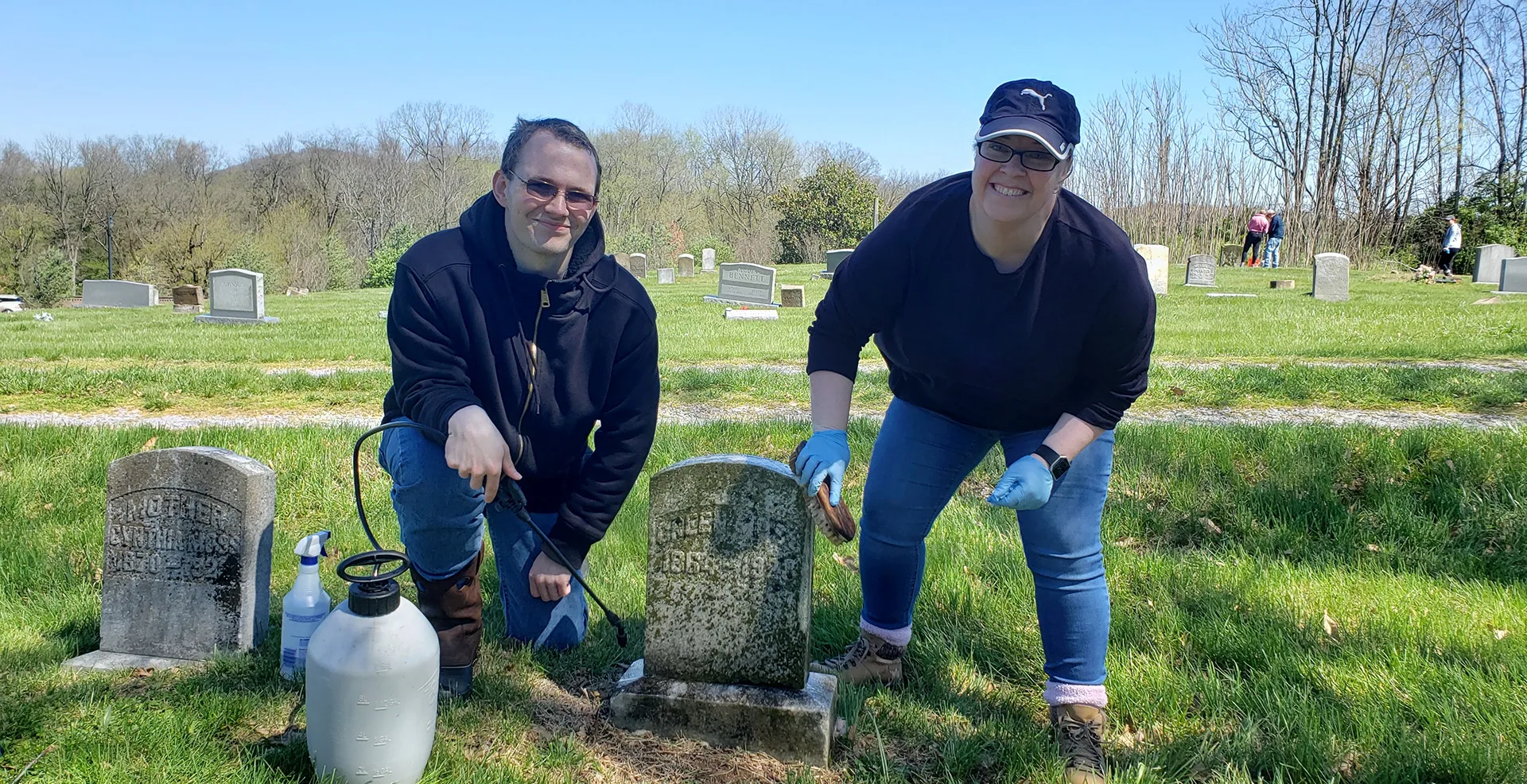
History
MTSU's MA in History, Public History Concentration, offers hands-on training, renowned faculty, and career opportunities.
History, Public History Concentration, M.A.
Are you passionate about interpreting and preserving History for public audiences? The Public History program at MTSU is the right place for you! We are the premiere graduate program for students training for careers as Public History professionals. From archives to museum management, historic preservation and cultural resource management to public archeology, oral history to digital methods, the History MA, Public History Concentration offers distinguished faculty, rigorous coursework, and unparalleled opportunities for hands-on training in the field.
History MA, Public History Concentration Highlights:
- One-on-one mentoring from nationally recognized faculty and public history professionals
- Research and professional development opportunities with our renowned on-campus centers and initiatives and community partners, including the Center for Historic Preservation, Albert Gore Research Center, Center for Popular Music, and Rutherford County Archives
- Professional development opportunities in the local community, throughout Middle Tennessee, and beyond
- Graduate assistantships and scholarships offered on a competitive basis
- Afternoon and evening classes accommodate work and family life
- If you live in Alabama or Mississippi, you may be able to attend MTSU at the in-state rates under the Academic Common Market Program.
To prepare students for professional practice, the program partners with a number of on-campus centers and initiatives, including the Center for Historic Preservation, Albert Gore Research Center, Center for Popular Music, and Walker Library digital collections.
If you live in one of these states: AL MS; you may be able to attend MTSU at in-state rates under the Academic Common Market program.
News Briefs

MTSU’s new Gore Center exhibit tells story of U.S. democracy through political memorabilia
Middle Tennessee State University leaders and prominent Tennessee policy makers recently unveiled an exhibit by the Albert Gore Research Center celebrating American democracy through a display of campaign posters, political buttons, and other political memorabilia.[ Read More ]

Public History alumni help museum expand access to musical understanding
story by Leah Tolbert Lyons and Matthew Hibdon As you approach the intersection of Broadway and Rep. John Lewis Way in downtown Nashville, you will see a place that has been under development for years. No, it is not the Apple Store or the newest location for Hattie B’s Hot Chicken. It is the National [ Read More ]
News Briefs

MTSU’s new Gore Center exhibit tells story of U.S. democracy through political memorabilia
Middle Tennessee State University leaders and prominent Tennessee policy makers recently unveiled an exhibit by the Albert Gore Research Center celebrating American democracy through a display of campaign posters, political buttons, and other political memorabilia.[ Read More ]

Public History alumni help museum expand access to musical understanding
story by Leah Tolbert Lyons and Matthew Hibdon As you approach the intersection of Broadway and Rep. John Lewis Way in downtown Nashville, you will see a place that has been under development for years. No, it is not the Apple Store or the newest location for Hattie B’s Hot Chicken. It is the National [ Read More ]
Related Media

History, Public History Concentration, M.A.
Our graduates take a wide variety of jobs in a range of exciting Public History fields. Recent graduates hold positions at institutions such as the Tennessee State Museum, University of the South, Tennessee State Parks, New South Associates in North Carolina, and the Albert Gore Research Center. Other graduates have gone on to pursue doctoral work, including at the University of Oklahoma and the MTSU Public History Ph.D. program.
Public historians work in a wide range of professional settings with public audiences of all ages. Potential employers include archives, museums, historic organizations, historical societies, historic sites, private consulting firms, and historical agencies at all levels of government.
Examples of career possibilities with an advanced degree in public history include
- Architectural historian
- Archivist
- Author
- College professor/instructor
- Consultant
- Cultural heritage manager
- Cultural resources manager
- Digital librarian/cataloger
- Historic preservation planner
- Historian
- Museum/collections curator or administrator
- Oral historian
- Public archaeologist
American Association for State and Local History job postings
Employers of MTSU alumni include
- Alabama Department of Archives and History
- Advisory Council on Historic Preservation
- American Association for State and Local History
- Belle Meade Plantation
- Belmont Mansion
- East Tennessee Historical Society
- Historic Home of T.R.R. Cobb
- Historical Association of Catawba County, N.C.
- History Center, Diboll, Texas
- Huntsville (Ala.) Historic Preservation Commission
- Jean Lafitte National Historical Park and Preserve
- Land Trust for Tennessee
- Manzanar National Historic Site
- Maymont Foundation, Richmond, Va.
- Metro Nashville Arts Commission
- Mike Curb Archives
- New South Associates
- Ohio History Connection
- President James K. Polk Ancestral Home
- Rutherford County Archives
- Tennessee Agricultural Museum
- Tennessee Department of Transportation
- Tennessee State Library and Archives
- Thomason & Associates
- Vicksburg (Miss.) Foundation for Historic Preservation
- Williamson County Archives and Museum
- War in the Pacific National Historical, Guam

MTSU’s Career Development Center
MTSU offers a comprehensive Career Development Center that serves students throughout the full student experience and beyond. They collaborate with faculty and staff to equip students with the tools to be marketable to the world of work and continuing education.
Students can schedule an appointment or check online resources and job boards at mtsu.edu/career.
Students can find current internship opportunities by talking to faculty and visiting the University job and internship board called Handshake.
Wondering what you can do with your major? Check out our What Can I Do with A Major In guides.



Academic links
- M.A. Public History Student Handbook
- M.A. Public History Internships
- Student Learning Outcomes for History Graduate Seminars
- Student Learning Outcomes for Public History Seminars
- Professional Development
- Maymester Experience Visiting Professors
On-campus partners
- Center for Historic Preservation
- Center for Popular Music
- Albert Gore Research Center
- MTSU Digital Collections
- Walker Library Media Studio
For students
- Association of Graduate Students in History
- Current History Graduate Students
- Public History Internships
- Public History Student Portfolios
- Society of American Archivists - MTSU Student Chapter
Public History news
- Public History Newsletters
- Center for Historic Preservation Annual Reports
- Center for Popular Music Annual Reports
Program history
The MTSU Department of History added an emphasis in historic preservation to its Master's program in 1976 and to its former doctorate degree in 1981. Historic preservation and the preservation of American popular music assumed a public dimension in 1984when MTSU established the Center for Historic Preservation and the Center for Popular Music, with missions that combined research and public outreach. After adding courses in museum studies, material culture, and archival methods, the master's program concentration changed its name to Public History in 1991. History faculty also developed the Albert Gore Research Center, which opened in 1993. In 2005, the department launched a new Ph.D. in Public History, the first doctoral program nationally to declare public history as the major field of study. Today, MTSU's Public History program partners with all three campus centers and collaborates with the Walker Library Media Studio to develop digital collections and other digital initiatives.
Financial aid links
Graduate Assistantships
To help support students pursuing graduate study, the Department of History offers a number of graduate assistantships at both the M.A. and the Ph.D. levels. These assistantships are awarded on a competitive basis and are renewable for up to two years for M.A.assistantships and up to three years for Ph.D. assistantships. Graduate assistants receive a tuition waiver plus a stipend to cover living expenses. In return, graduate assistants work a maximum of 20 hours a week during the semester on an assignment determined by the History Department. These assignments include work as teaching assistants, research assistants, and other duties related to the ongoing work of the department and our on-campus partners. To apply for a graduate assistantship with the HistoryDepartment, complete the College of Graduate Studies' Graduate Assistantship Application, and submit it to the Department of History along with the rest of your application.
Many M.A. and Ph.D students in the History Department also work as research fellows, graduate assistants, and hourly employees for MTSU's Center for Historic Preservation. The Center has a separate application and review process for these positions. You can read full descriptions of these opportunities on the Center's Academic Opportunities page and download the Center's Application for Student Academic Support. The department urges students applying for a graduate assistantship with the History Department toa pply to the Center as well.

CONTACT US














